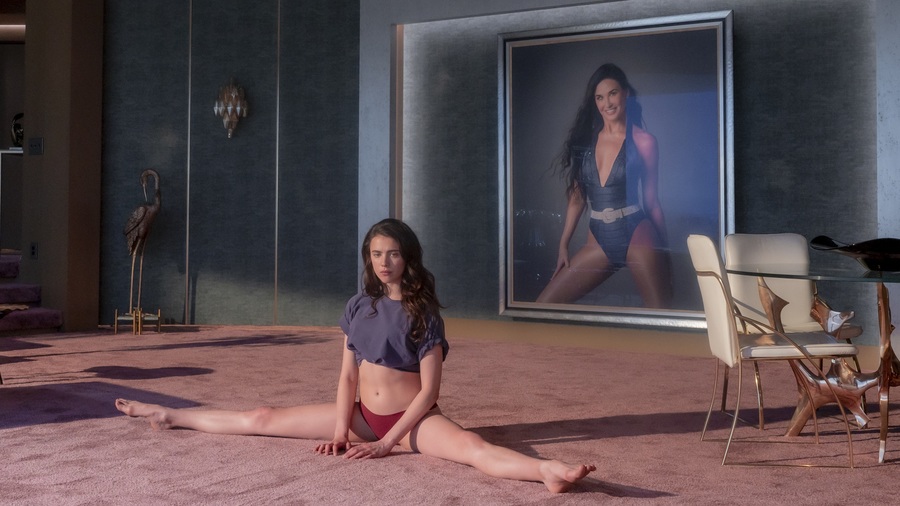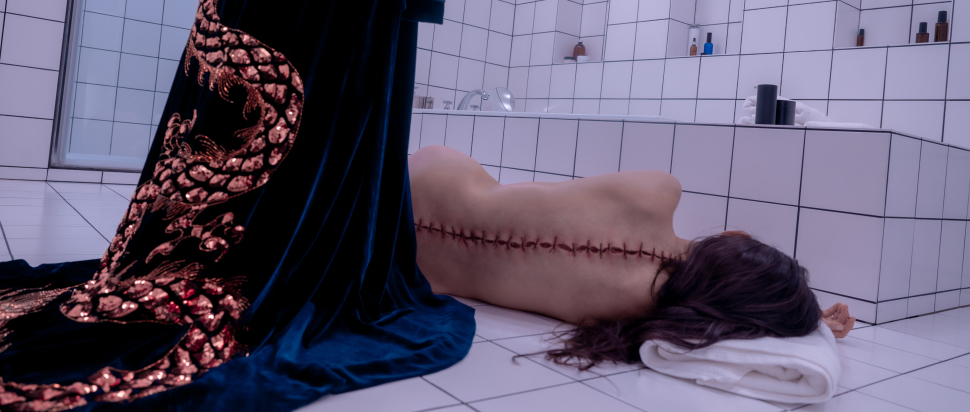Flirting with the grotesque: Coralie Fargeat on The Substance
The Substance, a gonzo horror starring Demi Moore as an ageing actress who refuses to be put out to pasture, comes to cinemas on a wave of critical acclaim. Director Coralie Fargeat tells us about her love of excess and finding the perfect lead in Moore
Pearl-clutchers, beware. A new film from Coralie Fargeat – the French provocateur whose bolshy aesthetic makes male enfants terribles like Quentin Tarantino or Gaspar Noé look positively quaint – is coming to a cinema near you. She burst onto the scene in 2017 with the bloody rape-revenge thriller titled, quite simply, Revenge. A colour-saturated exploitation picture low on plot but high on style, it was rapturously received as the perfect midnight movie for the post #MeToo era. It did have its detractors, though. Some critics found its violence sadistic and its plot implausible, although it doesn’t sound like Fargeat would disagree on the latter point. Realism is not her concern.
“When you're making a realist film, you have to conform; there's stuff you can't do,” she tells me over Zoom when I ask about her films’ tendencies to break the basic tenets of physics and biology. “You have to be polite with realism, you know? You have to behave. I like genre because it’s the zone where you can invent your own rules.”
Fargeat has had this aversion to the real world since her childhood in Paris. “I was obsessed with watching movies as a kid because they took me out of my everyday life, which felt quite inadequate to me.” This obsession extended to making her own movies after her parents bought a video camera. “It was a little camcorder for filming family vacations,” she recalls, “but I immediately took it and started making short films. That was the moment in childhood where I felt most happy and confident and allowed to express myself.”
We’re pleased to report that even those early filmmaking dalliances were gnarly. “I remember one of my very first little amateur movies when I was, like, maybe 14. Well, I don't remember the plot, but I remember having fun playing with this severed latex hand I had as a toy.” There’s plenty of body horror too in Fargeat’s new film, The Substance, which follows Demi Moore as Elisabeth Sparkle, a once-acclaimed Hollywood actor who’s now a TV fitness instructor. But Elisabeth has committed the biggest crime a woman can commit in showbusiness: she’s turned 50, and Dennis Quaid’s producer character (named Harvey, no less) decides it’s time to trade Elisabeth in for a younger model.
This is where “The Substance” comes in. It’s a black market, luminous yellow liquid that, once injected, creates a younger version of you that’s birthed from your spine like a reverse Xenomorph in Alien. This “improved” version of Elisabeth is Sue, played by Margaret Qualley as a luminous airhead. The catch is only one of the women can be conscious at any one time, and must swap places every seven days to keep balance in check. But Sue, who’s quickly cast by Harvey as Elizabeth’s replacement in a sexed-up reboot of her show, starts to greedily extend her allotted time.
Fargeat’s breakthrough short film Reality+ covered similar ground – it tells the story of a shlubby guy who joins the latest beauty industry craze by having a chip implanted that gives you the illusion of the perfect body for 24 hours. “This theme is something I've been working around for a long time,” she tells me. “I wrote other stories in different forms that were also about dealing with the way you look, how people see you, how you see yourself, depending on the expectations that you think people have on you.”
This interest began in childhood, she reckons: “I didn't feel confident in my everyday life growing up. When I analyze it now, I think it has a lot to do with the expectations that people have on you when you're a little girl – what you're supposed to look like, what you're supposed to like to play with. I always felt outside of those expectations, you know? I didn't like to play with dolls. I'd rather do the fun stuff the guys were allowed to do. So I think all that really shaped the way I felt in society.”
Fargeat, who’s 48, knows first-hand that our society’s judgement of women becomes even more toxic as they get older. “There’s a big shift when you approach your 40s or 50s, especially as women,” she says. “It’s a very violent thing that I went through. That spoke to many things that I also experienced when I was younger, and I felt ready to confront them in a very powerful, and hopefully entertaining way on film.”
Someone who knows about society’s misogynistic glare more than most is Demi Moore. She was the Brat Pack’s pinup girl in her 20s and the highest-paid actress in the world in her 30s. Her body was photographed and discussed in the media constantly. But interesting roles began to dry up when she hit her 40s. “There didn’t seem to be a place for me,” Moore recently told Interview Magazine. “I felt that feeling of, I’m not 20, I’m not 30, but I wasn’t yet what [Hollywood] perceived as a mother.”

Margaret Qualley in The Substance. Photo: MUBI
It’s a perfect piece of casting, but Fargeat didn’t have Moore in mind initially. “The only thing I knew was that the part was going to be extremely difficult to cast, because basically I was asking an actress to confront her very own phobia.” When Moore’s name was put on the table, Fargeat was sceptical. “To be honest, I said, 'OK, she will never want to do this. She would be too scared. There is not a chance. Let's not waste our time.”
Luckily someone passed the script to Moore anyway and it turns out Fargeat had the Hollywood star all wrong. “When I met Demi and we got to discuss the part, I understood that she had arrived at a place where she felt confident enough about how she dealt with all those issues to want to play them on screen,” Fargeat explains. “I started to understand how much she's been through all this, and all the thinking she’d already done, and all the work she did on herself to feel good about who she was. I think that's what allowed for the two of us to meet at a precise moment in both our lives where we felt we were ready and strong enough to put ourselves in a vulnerable place to bring this story to life.”
And bring it to life they have. When the film premiered at Cannes last spring, it blew the roof off and sent critics into a tizzy of hyperbole. Cannes’ jury, presided over this year by Greta Gerwig, dug it too, awarding Fargeat the Best Screenplay award. But don’t let the festival prestige fool you. The Substance isn’t arthouse horror. It’s a frenzied work of sanguinary excess in the vein of Brian de Palma or Paul Verhoeven. Certainly don’t call it “elevated horror” around Fargeat.
“I love the genre, and to me, genre is not elevated,” she says. “To me, the genre is the genre. That's what I like about it. There is this sense of excess. There is a sense of, you know, wild stuff. I'm still excited by the difference that has to me versus real life. It's also extremely creative, because I do think by letting go and letting things be excessive, that allows me to create some kind of poetry, some kind of pop art form that is compelling and funny and at the same time makes you reflect on yourself. To me, genre has to flirt with the grotesque, with the too much. It's a fine line, and you have to go very close to that line to make the best kind of genre film.”
The Substance is out in UK cinemas from 20 Sep via MUBI
